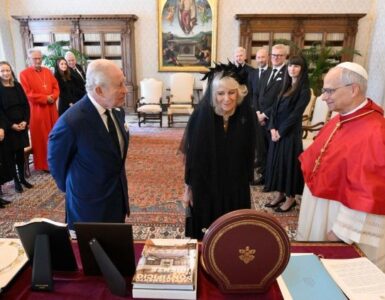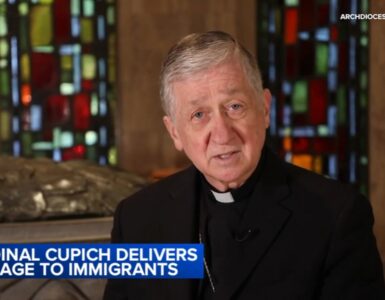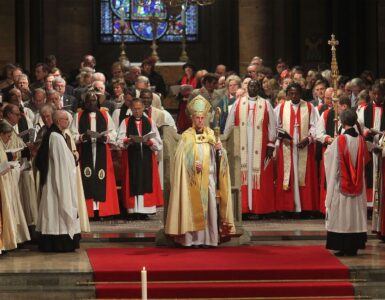By Ryan Grant
In the wake of the brutal assassination of Charlie Kirk, amidst the wave of discussion of his life and legacy there has been a lot of talk about his religious affiliation by various online influencers. Some want to hold that he is a martyr killed in odium fidei. Others, such as online influencer Candace Owens, have suggested that Charlie Kirk was actually Catholic, that he prayed the rosary, and this has been taken up by others, creating a side debate among Catholics and Protestants in social media.
These are the facts as we know them from publicly available data.
Charlie Kirk was a baptized Protestant, and was not shy of talking about the Bible, as well as his faith in his many interactions with university students. More recently, he spoke of the need for Protestants to venerate the Blessed Virgin, citing Scripture and her close connection with her Divine Son. While astounding for a Protestant, this is not unheard of. In my own personal experience I have known several Protestants of various denominations who held that Mary was a perpetual Virgin, and some reverence can be given to her, though they would stop short of hyper-dulia and Marian intercession. Furthermore, we know his wife is Catholic, and Charlie attended Mass with them (how frequently we don’t know for certain). And that’s really all we know.

Now, it has also been claimed that he recently convalidated his marriage in the Church. This is again, something significant, but not necessarily a sign of conversion. There are many cases where a Protestant spouse will be content to have their marriage convalidated in the Church as a mixed marriage, for the sake of the Catholic spouse’s conscience, yet also remain Protestant. Michael Hitchborn, founder of the Lepanto Institute, made the claim that Mr. Kirk was attending RCIA. Since Mr. Kirk was friends with Hitchborn, this is certainly possible, but we would need some verification from the pastor of his wife’s Church: was he in RCIA? Did he accept Catholicism as true and wished to convert? Was he attending RCIA so as to learn, while he had not yet determined to make a Catholic profession? These are all details that we would need in order to confirm a public profession, and that information is known with certainty only by the pastor of that parish, or most probably, his widow. Unless or until those are verified, we simply cannot proceed as if it is a fact that he was Catholic or going to convert.
There are many reasons for this, but the most important is the proper expression of Catholic Ecclesiology. A member of the Church is known by three signs: a) he professes right faith; b) he has the same communion of the Sacraments; c) he is in obedience to the same hierarchy. A lack of anyone of those will show that someone is not a member of the Church.
As we have noted, the only public profession of faith we have from Charlie Kirk is his Protestant faith, and consequently, was not in obedience to the hierarchy. As such, he could not be a member of the Catholic Church. Conversely, he was also baptized, and said positive things about the Blessed Virgin, and showed great respect for the Catholic faith by submitting his marriage to the judgment of the Church and convalidating it. Moreover, watching Charlie Kirk’s debates reveal, at least in his consistent public presentation, extraordinary natural virtue. What this means, in terms of his eternal rest, is that we as Catholics can have hope in his salvation. As Blessed Pius IX teaches,
Here, too, our beloved sons and venerable brothers, it is again necessary to mention and censure a very grave error entrapping some Catholics who believe that it is possible to arrive at eternal salvation although living in error and alienated from the true faith and Catholic unity. Such belief is certainly opposed to Catholic teaching. There are, of course, those who are struggling with invincible ignorance about our most holy religion. Sincerely observing the natural law and its precepts inscribed by God on all hearts and ready to obey God, they live honest lives and are able to attain eternal life by the efficacious virtue of divine light and grace. Because God knows, searches and clearly understands the minds, hearts, thoughts, and nature of all, his supreme kindness and clemency do not permit anyone at all who is not guilty of deliberate sin to suffer eternal punishments.[1]
Thus, it is in conformity with our teaching for Catholics to pray for Charlie Kirk, and to hope for his salvation; but this should stop short of any sort of canonization, or religious imagery depicting him as a martyr.
Now someone will say, couldn’t he have received Baptism of Blood?
This too, is an impossibility, based on the very teaching of Baptism of Blood as taught by the Fathers and Doctors. Firstly, Baptism of Blood in the strict sense applies to someone who is not baptized, yet professes not only right faith, but also killed in odium fidei.[2] Not only do we know from public profession that Charlie Kirk did not profess the Catholic faith, and that he was in fact baptized, the publicly available information and statements of the alleged killer are that he was motivated by Mr. Kirk’s political views, specifically on transgenderism, not specifically for his religion. All of these things make Baptism of Blood impossible in its proper signification.
Moreover, the very notion of martyrdom is that it is a public witness for Christ given by shedding one’s blood. This is why we also need a public profession of right faith, and a public hatred of the faith on the part of the alleged killer.
But what about Protestants or the Orthodox who are killed in odium fidei? What happens if it comes out that the killer really did hate his faith and killed him for it? This again, requires important distinctions. If we look to the Coptic martyrs slain in 2019,[3] for instance, they were in a Church separated from Rome and which professes the heresy of Miaphysitism, which is to say they were not, at least publicly, members of the Church; therefore properly, they cannot be true martyrs per the teaching of the Council of Florence.[4] Just the same, they were baptized, and if they were simple men, what might they know of theological controversy? If, ex parte eorum, they understood that they were in the true Church, but were materially mistaken on which was the true Church, it is certainly probable that they were saved, but this would be ex opere operantis, not ex opere operato. As Cardinal Billot teaches:
Thus it does not impede salvation, when one who ignorantly adheres to whatever false sect, provided that he should be in that disposition of mind (about which we will soon speak) and on the other hand he does not avert himself from the way prepared for justification. Is there not a witness to this truth, that even outside the boundaries of the Church, as I will say with Augustine, the sacraments emanate abundantly? Even that, indeed from the positive will of God, who could apply this condition to the validity of their sacraments, provided that they were confected by legitimate ministers. Now, if the sacraments emanate outside the boundaries of the Church, cannot the intention of those who are de facto separated from the visible communion of the Church be such that the sacraments profit them who live in good faith? Not only the sacraments, but even doctrine also, and, whereupon the preaching springs forth, in order that the Church should be the salt of the earth and the light of the world, even with respect to those who do not recognize the magisterium. Rather flowing through various and wondrous modes, they receive it although they do not perceive it. And through this, descending from the high ecclesiastical seat, directly or indirectly, whether through intention or through occasion, and the light of truth is sprinkled and the notion of divine revelation arrives even to many outside the Church, at least in so far as to fundamental points which necessarily ought to be explicitly believed, and thus to this point the grace of justification arrives outside the sacrament so that a man should convert to God through perfect charity. Nevertheless, God does not need any human minister, that faith, which is the beginning and root of justification, might instill itself into a man so ordained through bestowing the help of grace.[5]
Thus, if we recall these principles to the case of Charlie Kirk, we would again say there is hope for his salvation. But because he was not a public member of the Church, he cannot be a true martyr in the way that non-Catholics are not formally and properly considered martyrs.
Certainly, people can refer to Mr. Kirk as a martyr in a broad sense, e.g. a martyr for free speech, a martyr for this or that cause which he championed, etc., and this presents no problem for theology. Just the same, no matter how much natural virtue which someone we admire would seem to possess, and how much hope we may have that he is saved and will reign with Christ forever and ever, we need to exercise caution in portraying him other than he was, in absence of formal evidence.
This is precisely what the first bishop of the United States, John Carroll, did following the death of George Washington. Carroll was friends with Washington, and had witnessed Washington’s natural virtues firsthand. Yet, he instructed all of the clergy that they should not honor Washington with any funeral rites, or again preach about him religiously, but should give a secular eulogy as they would for a non-Catholic in ancient times.[6] This then, is the proper way to honor someone of national importance.

In closing, while I had not heard of Charlie Kirk before maybe 6 months ago, in watching many of his debates I admire his patience, his tolerance, his intellect, and frankly, his charity in debate. He never visibly became angry in situations which would have utterly infuriated me, and by all accounts he was an excellent husband and father. It is crystal clear why so many wish to venerate his memory; we must do so, however, with a mind to the nature of the Church, and in accord with Catholic teaching.
Subscribe to the paper!
Locals access: PDF version, hours of video content and more!
Physical edition

[1] Quanto Conficiamur Moerore, n. 7.
[2] Catechism of the Catholic Church, n. 1258; cf. St. Robert Bellarmine, De Baptismo, c. 6; St. Thomas Aquinas III, q. 66, a. 11, in the body of the article.
[3] https://www.forbes.com/sites/ewelinaochab/2019/02/14/remembering-the-21-coptic-orthodox-christians-murdered-by-daesh/
[4] Cantate Domino.
[5] Ecclesia de Sacramentis, tomus prior, Rome 1924, pp. 120-121: Non ergo impedit salutem, quod quis ignoranter ad quamcumque falsam sectam adhaereat, dummodo sit in ea animi dispositione de qua mox dictum est, et aliunde a justificationis via unicuique praeparata sese non avertat. Nonne huic veritati attestatur, quod etiam extra Ecclesiae fines, ut cum Augustino loquar, sacramenta largiter emanant? Et id quidem ex positiva Dei voluntate qui ad ipsorum sacramentorum validitatem potuisset eam conditionem apponere, ut nonnisi a legitimis ministris conficerentur. Nunc autem, si extra Ecclesiae fines sacramenta emanant, nonne ea intentione ut prosint iis qui in bona fide versantes, ab ipsius Ecclesiae visibili communione sunt de facto separati? Et non solum sacramenta, sed doctrina quoque et praedicatio undequaque foras erumpit, ut sit Ecclesia sal terrae et lux mundi, etiam respectu eorum qui magisterium ejus non agnoscunt, sed ejus influxum variis et miris modis, quamvis non advertentes, recipiunt. Ac per hoc, ab alto cathedrae ecclesiasticae, directe vel indirecte, sive per intentionem sive per occasionem, descendit et spargitur veritatis lumen, pervenitque ad multos etiam extraneos notitia divinae revelationis, saltem quantum ad fundamentales articulos qui necessario debent esse explicite crediti, ad hoc ut possit homo per charitatem perfectam se ad Deum convertere, et sic ad justificationis gratiam extra sacramentum pervenire. Quamquam nec indigeat Deus humano quocumque ministerio, ut fidem quae justificationis est initium et radix, inspiret homini sese per gratiae auxilium omnibus oblatum disponentiâ.
[6] Pastoral Letter to the clergy of the Diocese, 29 December 1799, cited in The Life and Times of John Carroll, Peter Guilday, New York, Encyclopedia Press, 1922; p. 744.




